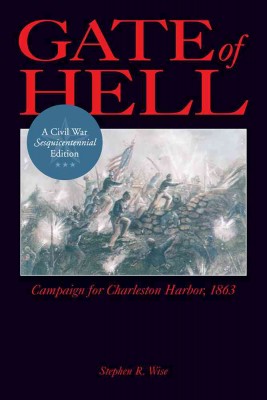| Gate of Hell: Campaign for Charleston Harbor, 1863 Contributor(s): Wise, Stephen R. (Author) |
|
 |
ISBN: 1611170117 ISBN-13: 9781611170115 Publisher: University of South Carolina Press OUR PRICE: $20.89 Product Type: Paperback - Other Formats Published: September 2011 |
| Additional Information |
| BISAC Categories: - History | United States - Civil War Period (1850-1877) - History | Military - General - History | United States - State & Local - South (al,ar,fl,ga,ky,la,ms,nc,sc,tn,va,wv) |
| Dewey: 973.734 |
| LCCN: 2012371116 |
| Physical Information: 1" H x 6" W x 9" (1.05 lbs) 344 pages |
| Themes: - Chronological Period - 1851-1899 - Topical - Civil War - Cultural Region - Southeast U.S. - Geographic Orientation - South Carolina - Cultural Region - South Atlantic |
| Descriptions, Reviews, Etc. |
| Publisher Description: Known for sharply affecting the Civil War's outcome, the Charleston campaign of 1863 included the Battle for Battery Wagner, which featured the Union African American regiment portrayed in the film Glory as well as Red Cross founder Clara Barton. Stephen R. Wise vividly re-creates the campaign in Gate of Hell, and his retelling of the battle pits not only black against white and North against South but also army against navy. Wise contends that the significance of the campaign extends beyond its outcome, arguing that an understanding of the strategy used at Charleston is vital to understanding the very nature of the Civil War. Lasting almost two months and resulting in thousands of casualties, the campaign began as a joint army-navy operation. Wise continues to follow the campaign through the capture of Battery Wagner and near-demolition of Fort Sumter to its final days, when the Confederates prevented Union forces from entering the port city. Wise describes the campaign as a major testing ground for African American troops and attributes Lincoln's expansion of African American recruitment to the admirable performance of the 54th Massachusetts. Wise ultimately concludes that the skill, and in some cases foolish theatrics, of the campaign's leaders determined the course of the campaign. |